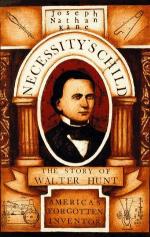|
This section contains 339 words (approx. 2 pages at 300 words per page) |
World of Invention on Walter Hunt
Walter Hunt was a remarkably creative and prolific inventor who seldom bothered to patent or profit from his numerous devices. Born in Martinsburg, New York, Hunt invented a flax-spinning machine by the time he was 20 years old. He set up a small shop in New York City in 1826 and supported himself in the real estate business while developing dozens of practical devices. In 1827 he invented an alarm gong for streetcars, fire engines, and police stations. Then he designed the Globe coal-burning stove, a knife sharpener, and a restaurant steam table.
Sometime between 1832 and 1834 in his Amos Street shop, Hunt invented the first modern, practical sewing machine. It featured an eye-pointed needle and a second thread that created a stitch. True to form, Hunt didn't patent the machine. Legend has it that his daughter said he shouldn't market the machine lest seamstresses be put out of work. When he finally did attempt to patent the machine after Elias Howe applied for his own sewing-machine patent in 1846, Hunt was refused on the grounds that he had abandoned the design, although he was recognized as having preceded Howe with the concept.
Hunt followed his sewing machine with many improvements to firearms, an ice-breaking boat, paraffin candles, a velocipede, a machine for making nails and rivets, a street-sweeping machine, conical bullets, a self-closing inkwell, and a fountain pen. He even invented the Antipodean Performers-suction shoes used by circus performers to walk up walls and across ceilings.
Hunt invented the safety pin in three hours one day in 1849 to pay off a $15 debt; he did patent this device but later sold his patent outright for $400. In 1854, Hunt invented a throw-away paper collar. Again, he patented the design and this time arranged for royalty payments, but the paper collar became popular only after Hunt died. Isaac Singer arranged to pay Hunt $50,000 for his sewing machine design in 1858 in order to clear up the patent confusion about sewing machines, but Hunt died in New York in 1859 before Singer was able to make any payments.
|
This section contains 339 words (approx. 2 pages at 300 words per page) |


